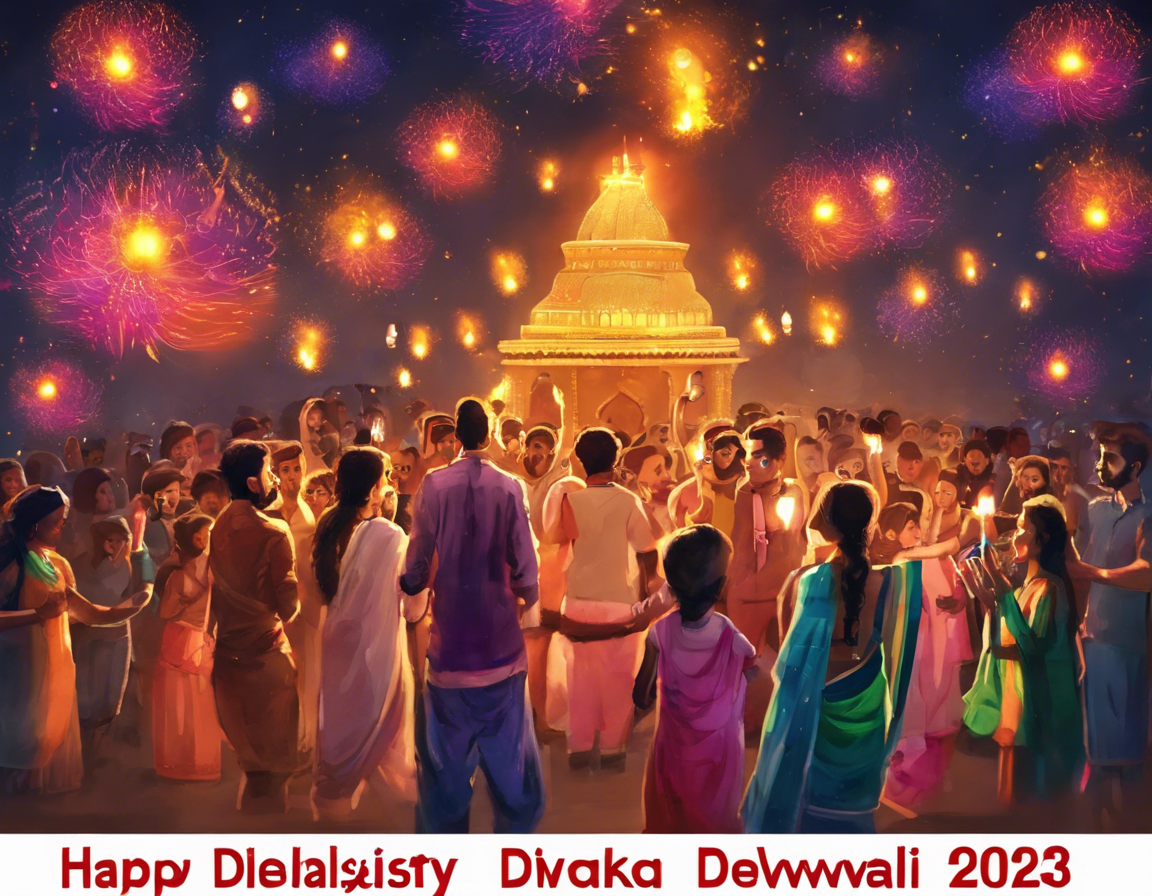Diwali, also known as the Festival of Lights, is one of the most significant festivals in Hindu culture and is celebrated with great enthusiasm and fervor by millions of people across the globe. The date of Diwali is determined by the Hindu lunar calendar and falls on the fifteenth day of Kartik, the holiest month in the Hindu calendar. In 2023, Diwali is set to be celebrated on Wednesday, 18th October, marking the culmination of a five-day festival that begins with Dhanteras and includes Chhoti Diwali, Diwali, Govardhan Puja, and Bhai Dooj.
Significance of Diwali:
Diwali holds immense cultural, religious, and historical significance. The festival signifies the victory of light over darkness and good over evil. It commemorates the return of Lord Rama, along with his wife Sita and brother Lakshmana, from a fourteen-year exile and his triumph over the demon king Ravana. In addition to being associated with various legends and mythological stories, Diwali is a time for families to come together, exchange gifts, decorate their homes, light oil lamps (diyas), burst firecrackers, and share festive meals.
Traditions and Rituals:
Diwali is celebrated with a plethora of traditions and rituals that vary across different regions of India and among the diverse communities that observe the festival. Some common customs include:
Cleaning and Decoration:
- Homes are cleaned and decorated to welcome Goddess Lakshmi, the symbol of wealth and prosperity. Rangoli patterns made from colored powders, flowers, or rice decorate the entrances of houses.
- String lights, lanterns, and diyas are lit to illuminate homes and create a festive atmosphere.
Puja and Prayers:
- A traditional puja is performed in the evening to invoke the blessings of the deities, especially Goddess Lakshmi and Lord Ganesha.
- Special prayers, hymns, and mantras are recited, and offerings of sweets, fruits, and flowers are made to the deities.
Sweets and Savories:
- Delicious sweets and savories are prepared and distributed among family, friends, and neighbors.
- Popular Diwali treats include ladoos, barfis, gujiyas, and namkeen snacks.
Fireworks and Celebrations:
- Fireworks and firecrackers light up the night sky, symbolizing the victory of good over evil and driving away negative energies.
- Community gatherings, cultural performances, and exchange of gifts are common during Diwali.
Eco-Friendly Celebrations:
In recent years, there has been a growing emphasis on celebrating eco-friendly Diwali by minimizing noise and air pollution, reducing waste, and promoting sustainable practices. Opting for green fireworks, LED lights, and natural decorations can help minimize the environmental impact of the festival.
FAQs:
Q: What is the spiritual significance of Diwali?
A: Diwali symbolizes the victory of light over darkness, knowledge over ignorance, and good over evil. It is a time to dispel negativity and welcome positivity into our lives.
Q: How long does Diwali last?
A: Diwali is a five-day festival, with each day holding its own significance and rituals. The main day of celebrations falls on the third day, which is known as Diwali or Deepavali.
Q: Why is Goddess Lakshmi worshipped on Diwali?
A: Goddess Lakshmi is revered on Diwali as the deity of wealth, prosperity, and abundance. Worshipping her is believed to bring blessings of prosperity and good fortune.
Q: What are some traditional Diwali foods?
A: Some traditional Diwali foods include sweets like ladoos, barfis, and jalebis, as well as savory snacks like namkeen, mathri, and samosas.
Q: How can one celebrate a green Diwali?
A: To celebrate an eco-friendly Diwali, one can opt for green fireworks, use LED lights, decorate with natural materials, and avoid excessive use of plastic and harmful chemicals.
Q: Is Diwali only celebrated by Hindus?
A: While Diwali is predominantly a Hindu festival, it is also celebrated by Jains, Sikhs, and Buddhists for different reasons and with varying traditions.
Q: What is the significance of lighting diyas on Diwali?
A: Lighting diyas symbolizes the victory of light over darkness and is believed to dispel negative energies, bring positivity, and invite prosperity into the home.
Q: Are there any regional variations in Diwali celebrations?
A: Yes, Diwali traditions and rituals can vary from region to region in India. Each community may have its own customs, legends, and ways of celebrating the festival.
Q: What is the story behind fireworks on Diwali?
A: Fireworks are believed to represent the joyous celebration of Lord Rama’s return to Ayodhya after defeating Ravana. The loud noises are also said to drive away evil spirits.
Q: How can one wish someone a Happy Diwali?
A: One can wish someone a Happy Diwali by saying “Happy Diwali” or “Wishing you a joyous Diwali filled with light and prosperity.” Sending personalized greetings and gifts is also a common way to convey warm wishes during the festival.
Diwali is a time of joy, togetherness, and spiritual upliftment. It serves as a reminder of the triumph of good over evil and the importance of spreading love and light in the world. Whether you celebrate with grandeur or in a more subdued manner, the essence of Diwali lies in the spirit of unity and positivity that it fosters among communities worldwide.
